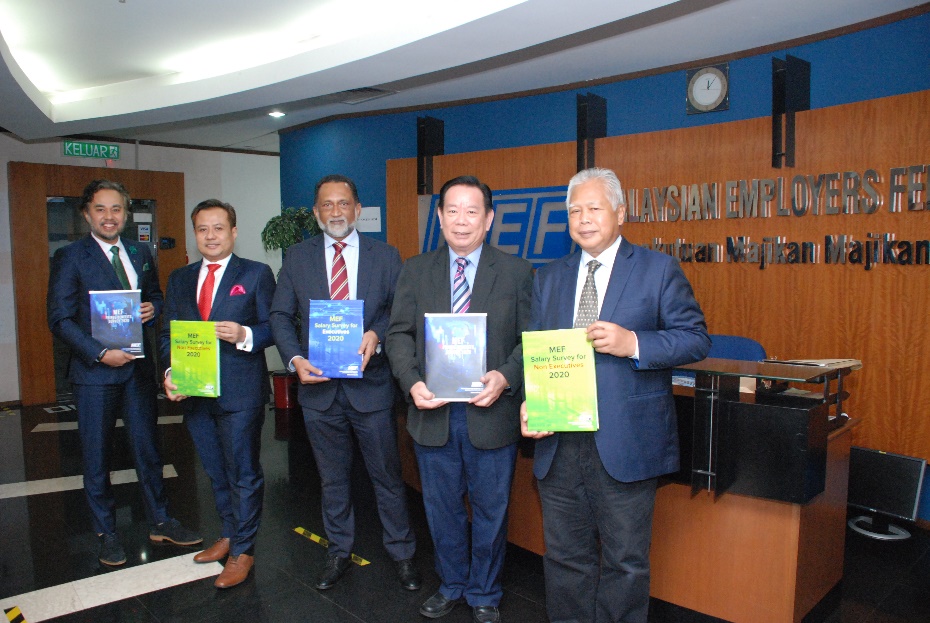PETALING JAYA: The latest “MEF Salary Surveys for Executives and Non-Executives” have indicated a substantial drop in the instances of employers giving salary increments and bonuses to their staff in 2020.
In launching the annual salary surveys, MEF President Datuk Dr Syed Hussain Syed Husman said only 58.4% of respondent companies granted salary increase to their executive staff compared with 88.3% in 2019, while for the non-executives only 61.7% of companies granted salary increase compared with87.6% last year.
The average salary increases for executives and non-executives were also lower than 2019 with 4.82% (5.15% in 2019) and 4.79% (4.96% in 2019) respectively.
“The results were expected due to the adverse impact of Covid-19. This trend is expected to persist into next year as the forecasted average salary increases for executives and non-executives in 2021 were even lower at 4.59% and 4.57% respectively,” Syed Hussain said here today.
He said the forecasted bonus for executives and non-executives in 2021 also dropped to 1.75 and 1.57 months respectively compared with the actual bonus of 1.94 and 1.65 months of bonus granted in 2020.
The 26th edition of the MEF Salary Survey for Executives covered 179 benchmarked positions of 20,733 executives, while the Non-Executives survey covered 64,625 non-executives with 138 benchmarked positions.
Syed Hussain added that during the MCO, respondent companies operated at 60% to 70% of the workforce capacity and increased to 80% for all levels of executives from top management to executive staff during CMCO.
The workforce capacity utilisation for non-executives ranging from General Labourer/ Unskilled Employees to Supervisors was lower at approximately 56% during MCO as compared to 77% during CMCO.
On remote work arrangements, Syed Hussain stated that respondent companies adopted remote work arrangements during MCO and CMCO. 41.1% of the respondent companies experienced lower levels of productivity of their executives while half of the respondent companies reported that the productivity level of their non-executives was lower during MCO and CMCO as compared to previous normal work arrangement.
“More than half of respondent companies adopted hiring freeze of executives and non-executives in 2020 to cope with the impact of the Covid-19 pandemic while approximately 38% of the companies maintained their recruitment practices,” he said.
“About 36% of the respondent companies have yet to decide on their 2021 recruitment policy as the outlook for Covid -19 pandemic is still uncertain. 31.8% of the companies will maintain their new hiring policy while approximately 20% of the companies will adopt hiring freeze policy in 2021.”
In addition to the salary surveys, Syed Hussain also announced two other new publications – the “MEF Fringe Benefits Survey 2020” and the “MEF Analysis of Collective Agreements and Awards on Terms and Conditions of Employment 2019”.
He highlighted that the MEF Fringe Benefits Survey, which attracted 199 participants, revealed that the top reasons for employees being required to work from home during the MCO were because companies were required or encouraged by the authorities to do so (98.6%), followed by business survivability (58.8%).
Other reasons for employees working from home were because the employee needed to take care of children, that work could be conducted at home, new strategy to sustain business, WFH as a new working norm, and organisation’s diversification.
On the question of whether employees were required to utilise annual leave entitlement during the movement control order periods, 74% of respondents adhered to the government’s call not to utilise the annual leave entitlement of top / senior managers, managers (74.5%), executives (74.2%) and non-executives (76.3%) during MCO and CMCO periods.
On hospitalisation and non-hospitalisation leave, Syed Hussain highlighted that a total of 35,724.5 days of hospitalisation leave were taken by 2,158 employees for the period of July 2019 to July 2020. The average sick leave due to hospitalisation taken per employee during the same period was 16.6 days. From July 2019 to July 2020, a total of 116,261 days of sick leave (outpatient) were taken by 24,477 employees. The average sick leave (outpatient) taken per employee during the same period was 4.7 days.
He added that in 2019 there were 294 collective agreements concluded and 61 Industrial Court Awards on terms and conditions handed down by the Industrial Court.
Of the 281 collective agreements that granted across-the-board salary adjustment, 171 collective agreements provided for across-the-board salary adjustment at an average of 6.1% as compared to 6.2 % in 2018. The average amount of contractual bonus granted in 2019 was 1.6 months.









